Psychology Assignment: Conformity, Social Facilitation, and Groups
VerifiedAdded on 2022/10/15
|7
|1856
|9
Homework Assignment
AI Summary
This psychology assignment explores the principles of conformity and social facilitation, delving into how individuals align their behaviors, beliefs, and attitudes with those of their social groups. It examines the influence of normative and informational influences on conformity, illustrating these concepts with real-world examples, including instances from the student's academic experiences. The assignment also analyzes social facilitation, discussing how the presence of others can affect individual performance and motivation within group settings. The paper provides insights into how group dynamics, including social loafing and group cohesion, impact individual behavior and the overall effectiveness of group projects. The assignment integrates personal experiences, course concepts, and psychological research to offer a comprehensive analysis of these core psychological principles.
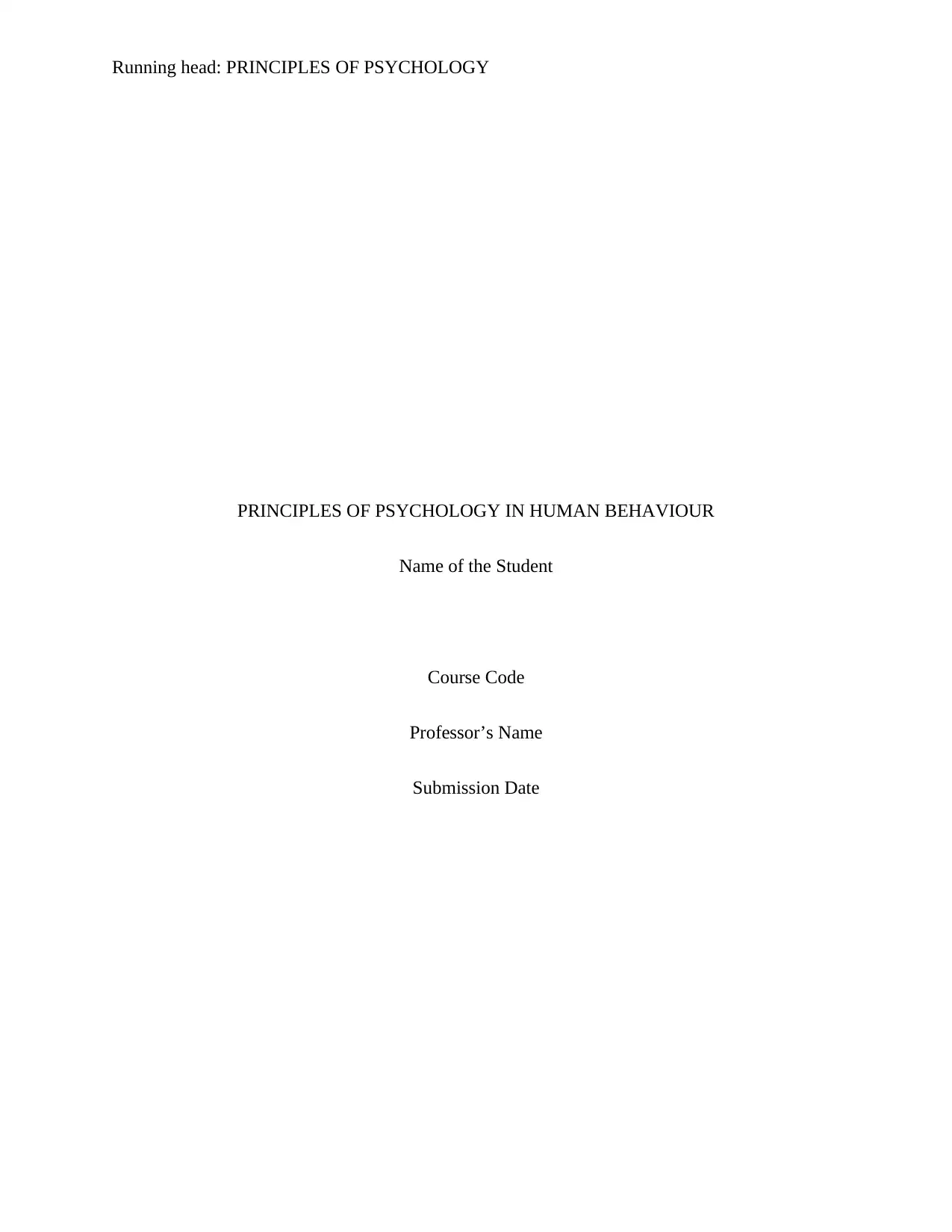
Running head: PRINCIPLES OF PSYCHOLOGY
PRINCIPLES OF PSYCHOLOGY IN HUMAN BEHAVIOUR
Name of the Student
Course Code
Professor’s Name
Submission Date
PRINCIPLES OF PSYCHOLOGY IN HUMAN BEHAVIOUR
Name of the Student
Course Code
Professor’s Name
Submission Date
Paraphrase This Document
Need a fresh take? Get an instant paraphrase of this document with our AI Paraphraser
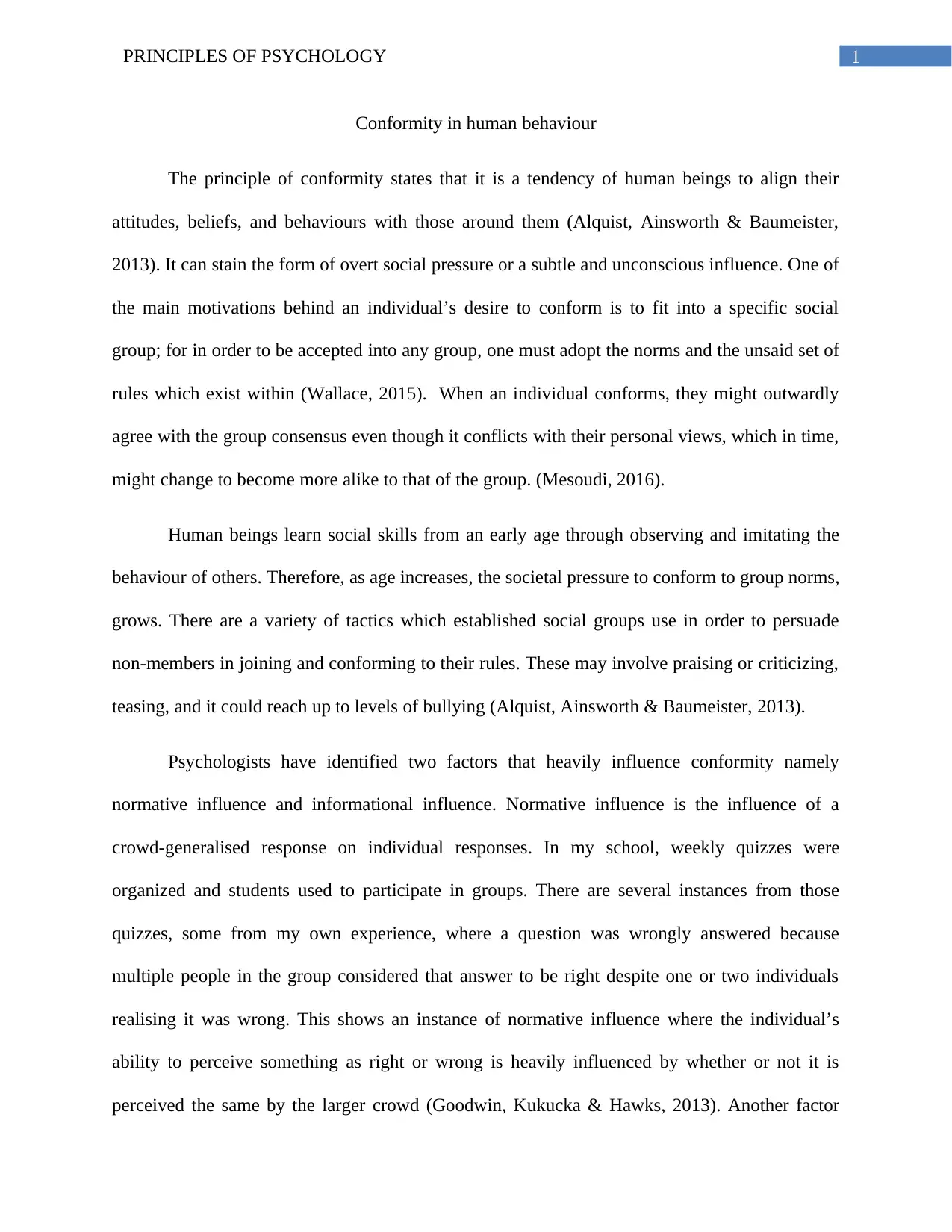
1PRINCIPLES OF PSYCHOLOGY
Conformity in human behaviour
The principle of conformity states that it is a tendency of human beings to align their
attitudes, beliefs, and behaviours with those around them (Alquist, Ainsworth & Baumeister,
2013). It can stain the form of overt social pressure or a subtle and unconscious influence. One of
the main motivations behind an individual’s desire to conform is to fit into a specific social
group; for in order to be accepted into any group, one must adopt the norms and the unsaid set of
rules which exist within (Wallace, 2015). When an individual conforms, they might outwardly
agree with the group consensus even though it conflicts with their personal views, which in time,
might change to become more alike to that of the group. (Mesoudi, 2016).
Human beings learn social skills from an early age through observing and imitating the
behaviour of others. Therefore, as age increases, the societal pressure to conform to group norms,
grows. There are a variety of tactics which established social groups use in order to persuade
non-members in joining and conforming to their rules. These may involve praising or criticizing,
teasing, and it could reach up to levels of bullying (Alquist, Ainsworth & Baumeister, 2013).
Psychologists have identified two factors that heavily influence conformity namely
normative influence and informational influence. Normative influence is the influence of a
crowd-generalised response on individual responses. In my school, weekly quizzes were
organized and students used to participate in groups. There are several instances from those
quizzes, some from my own experience, where a question was wrongly answered because
multiple people in the group considered that answer to be right despite one or two individuals
realising it was wrong. This shows an instance of normative influence where the individual’s
ability to perceive something as right or wrong is heavily influenced by whether or not it is
perceived the same by the larger crowd (Goodwin, Kukucka & Hawks, 2013). Another factor
Conformity in human behaviour
The principle of conformity states that it is a tendency of human beings to align their
attitudes, beliefs, and behaviours with those around them (Alquist, Ainsworth & Baumeister,
2013). It can stain the form of overt social pressure or a subtle and unconscious influence. One of
the main motivations behind an individual’s desire to conform is to fit into a specific social
group; for in order to be accepted into any group, one must adopt the norms and the unsaid set of
rules which exist within (Wallace, 2015). When an individual conforms, they might outwardly
agree with the group consensus even though it conflicts with their personal views, which in time,
might change to become more alike to that of the group. (Mesoudi, 2016).
Human beings learn social skills from an early age through observing and imitating the
behaviour of others. Therefore, as age increases, the societal pressure to conform to group norms,
grows. There are a variety of tactics which established social groups use in order to persuade
non-members in joining and conforming to their rules. These may involve praising or criticizing,
teasing, and it could reach up to levels of bullying (Alquist, Ainsworth & Baumeister, 2013).
Psychologists have identified two factors that heavily influence conformity namely
normative influence and informational influence. Normative influence is the influence of a
crowd-generalised response on individual responses. In my school, weekly quizzes were
organized and students used to participate in groups. There are several instances from those
quizzes, some from my own experience, where a question was wrongly answered because
multiple people in the group considered that answer to be right despite one or two individuals
realising it was wrong. This shows an instance of normative influence where the individual’s
ability to perceive something as right or wrong is heavily influenced by whether or not it is
perceived the same by the larger crowd (Goodwin, Kukucka & Hawks, 2013). Another factor
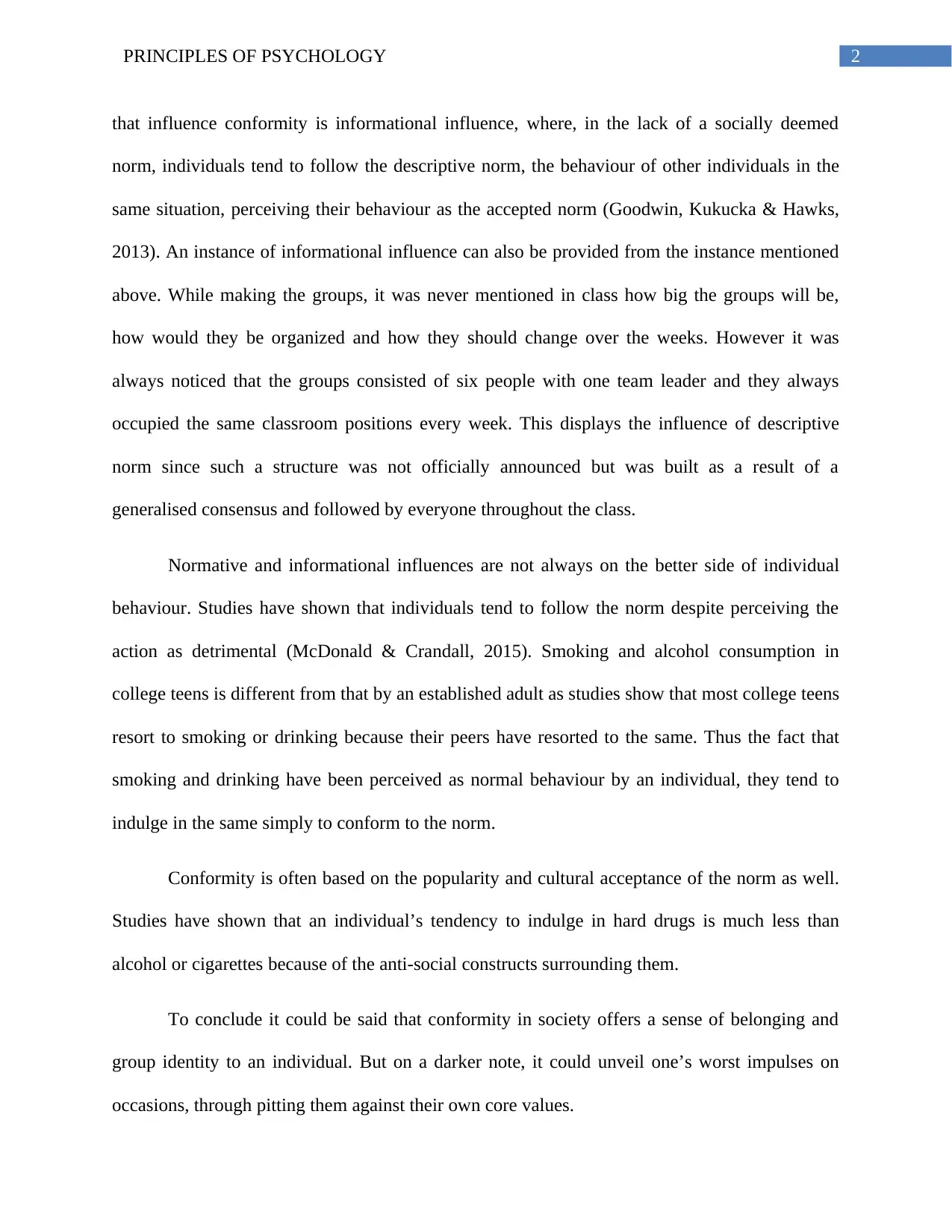
2PRINCIPLES OF PSYCHOLOGY
that influence conformity is informational influence, where, in the lack of a socially deemed
norm, individuals tend to follow the descriptive norm, the behaviour of other individuals in the
same situation, perceiving their behaviour as the accepted norm (Goodwin, Kukucka & Hawks,
2013). An instance of informational influence can also be provided from the instance mentioned
above. While making the groups, it was never mentioned in class how big the groups will be,
how would they be organized and how they should change over the weeks. However it was
always noticed that the groups consisted of six people with one team leader and they always
occupied the same classroom positions every week. This displays the influence of descriptive
norm since such a structure was not officially announced but was built as a result of a
generalised consensus and followed by everyone throughout the class.
Normative and informational influences are not always on the better side of individual
behaviour. Studies have shown that individuals tend to follow the norm despite perceiving the
action as detrimental (McDonald & Crandall, 2015). Smoking and alcohol consumption in
college teens is different from that by an established adult as studies show that most college teens
resort to smoking or drinking because their peers have resorted to the same. Thus the fact that
smoking and drinking have been perceived as normal behaviour by an individual, they tend to
indulge in the same simply to conform to the norm.
Conformity is often based on the popularity and cultural acceptance of the norm as well.
Studies have shown that an individual’s tendency to indulge in hard drugs is much less than
alcohol or cigarettes because of the anti-social constructs surrounding them.
To conclude it could be said that conformity in society offers a sense of belonging and
group identity to an individual. But on a darker note, it could unveil one’s worst impulses on
occasions, through pitting them against their own core values.
that influence conformity is informational influence, where, in the lack of a socially deemed
norm, individuals tend to follow the descriptive norm, the behaviour of other individuals in the
same situation, perceiving their behaviour as the accepted norm (Goodwin, Kukucka & Hawks,
2013). An instance of informational influence can also be provided from the instance mentioned
above. While making the groups, it was never mentioned in class how big the groups will be,
how would they be organized and how they should change over the weeks. However it was
always noticed that the groups consisted of six people with one team leader and they always
occupied the same classroom positions every week. This displays the influence of descriptive
norm since such a structure was not officially announced but was built as a result of a
generalised consensus and followed by everyone throughout the class.
Normative and informational influences are not always on the better side of individual
behaviour. Studies have shown that individuals tend to follow the norm despite perceiving the
action as detrimental (McDonald & Crandall, 2015). Smoking and alcohol consumption in
college teens is different from that by an established adult as studies show that most college teens
resort to smoking or drinking because their peers have resorted to the same. Thus the fact that
smoking and drinking have been perceived as normal behaviour by an individual, they tend to
indulge in the same simply to conform to the norm.
Conformity is often based on the popularity and cultural acceptance of the norm as well.
Studies have shown that an individual’s tendency to indulge in hard drugs is much less than
alcohol or cigarettes because of the anti-social constructs surrounding them.
To conclude it could be said that conformity in society offers a sense of belonging and
group identity to an individual. But on a darker note, it could unveil one’s worst impulses on
occasions, through pitting them against their own core values.
⊘ This is a preview!⊘
Do you want full access?
Subscribe today to unlock all pages.

Trusted by 1+ million students worldwide
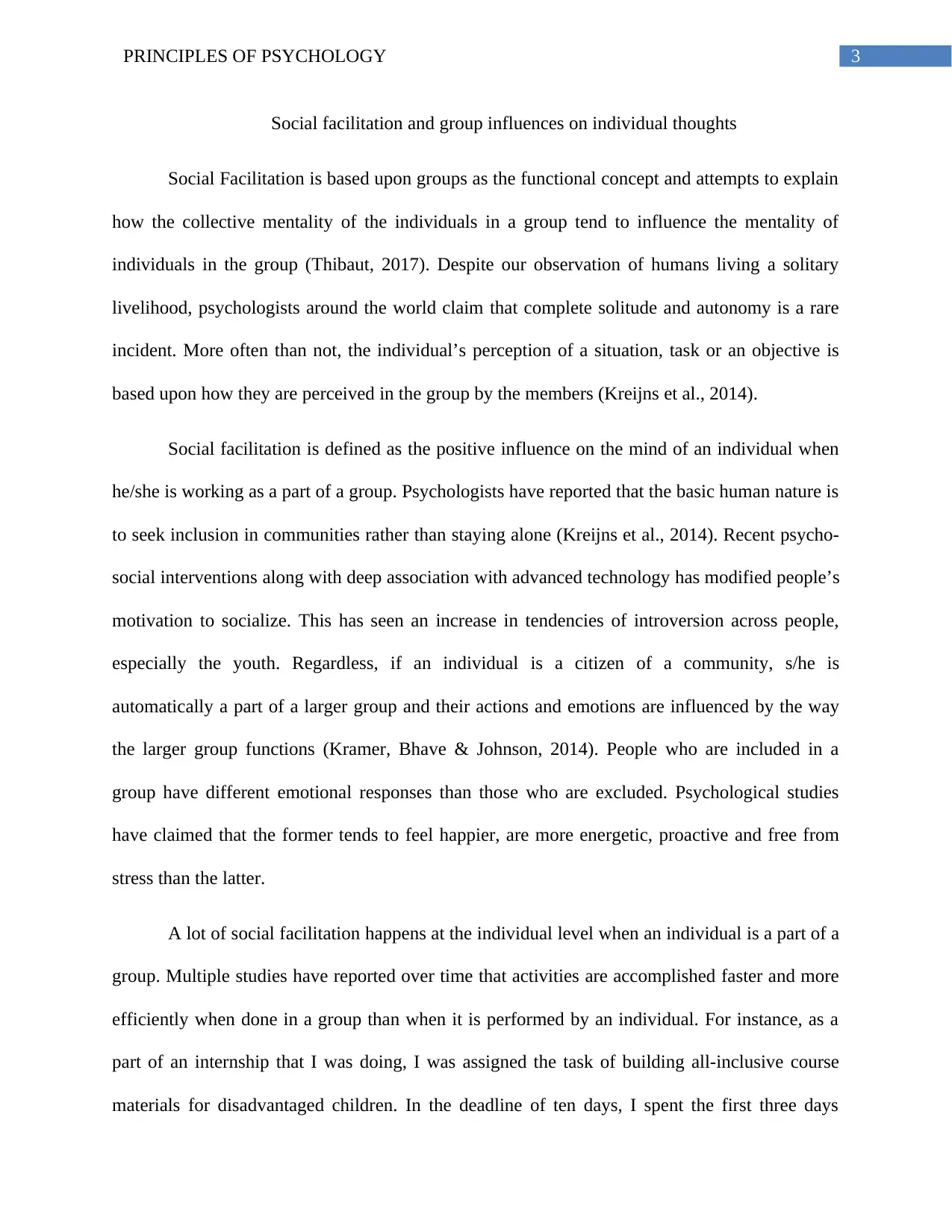
3PRINCIPLES OF PSYCHOLOGY
Social facilitation and group influences on individual thoughts
Social Facilitation is based upon groups as the functional concept and attempts to explain
how the collective mentality of the individuals in a group tend to influence the mentality of
individuals in the group (Thibaut, 2017). Despite our observation of humans living a solitary
livelihood, psychologists around the world claim that complete solitude and autonomy is a rare
incident. More often than not, the individual’s perception of a situation, task or an objective is
based upon how they are perceived in the group by the members (Kreijns et al., 2014).
Social facilitation is defined as the positive influence on the mind of an individual when
he/she is working as a part of a group. Psychologists have reported that the basic human nature is
to seek inclusion in communities rather than staying alone (Kreijns et al., 2014). Recent psycho-
social interventions along with deep association with advanced technology has modified people’s
motivation to socialize. This has seen an increase in tendencies of introversion across people,
especially the youth. Regardless, if an individual is a citizen of a community, s/he is
automatically a part of a larger group and their actions and emotions are influenced by the way
the larger group functions (Kramer, Bhave & Johnson, 2014). People who are included in a
group have different emotional responses than those who are excluded. Psychological studies
have claimed that the former tends to feel happier, are more energetic, proactive and free from
stress than the latter.
A lot of social facilitation happens at the individual level when an individual is a part of a
group. Multiple studies have reported over time that activities are accomplished faster and more
efficiently when done in a group than when it is performed by an individual. For instance, as a
part of an internship that I was doing, I was assigned the task of building all-inclusive course
materials for disadvantaged children. In the deadline of ten days, I spent the first three days
Social facilitation and group influences on individual thoughts
Social Facilitation is based upon groups as the functional concept and attempts to explain
how the collective mentality of the individuals in a group tend to influence the mentality of
individuals in the group (Thibaut, 2017). Despite our observation of humans living a solitary
livelihood, psychologists around the world claim that complete solitude and autonomy is a rare
incident. More often than not, the individual’s perception of a situation, task or an objective is
based upon how they are perceived in the group by the members (Kreijns et al., 2014).
Social facilitation is defined as the positive influence on the mind of an individual when
he/she is working as a part of a group. Psychologists have reported that the basic human nature is
to seek inclusion in communities rather than staying alone (Kreijns et al., 2014). Recent psycho-
social interventions along with deep association with advanced technology has modified people’s
motivation to socialize. This has seen an increase in tendencies of introversion across people,
especially the youth. Regardless, if an individual is a citizen of a community, s/he is
automatically a part of a larger group and their actions and emotions are influenced by the way
the larger group functions (Kramer, Bhave & Johnson, 2014). People who are included in a
group have different emotional responses than those who are excluded. Psychological studies
have claimed that the former tends to feel happier, are more energetic, proactive and free from
stress than the latter.
A lot of social facilitation happens at the individual level when an individual is a part of a
group. Multiple studies have reported over time that activities are accomplished faster and more
efficiently when done in a group than when it is performed by an individual. For instance, as a
part of an internship that I was doing, I was assigned the task of building all-inclusive course
materials for disadvantaged children. In the deadline of ten days, I spent the first three days
Paraphrase This Document
Need a fresh take? Get an instant paraphrase of this document with our AI Paraphraser
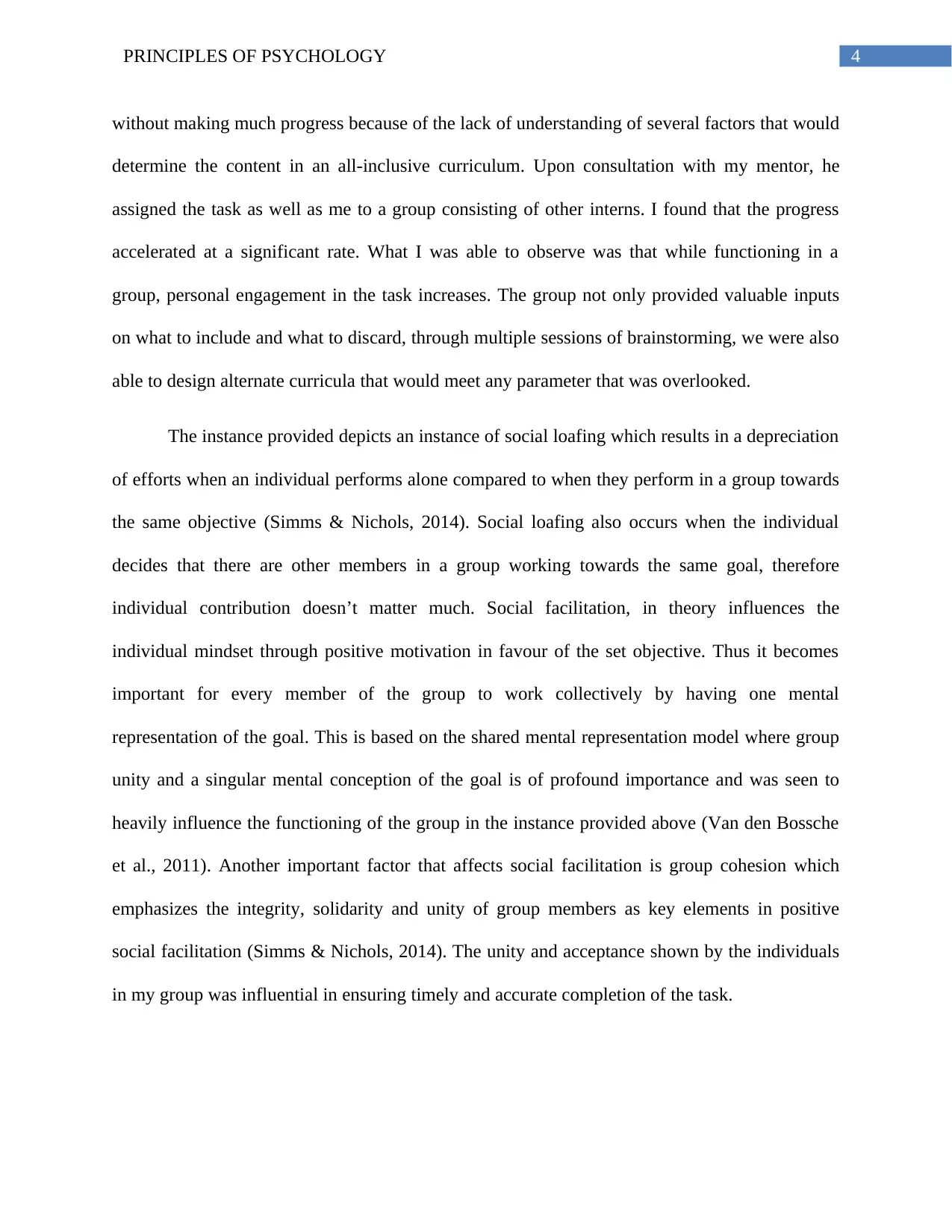
4PRINCIPLES OF PSYCHOLOGY
without making much progress because of the lack of understanding of several factors that would
determine the content in an all-inclusive curriculum. Upon consultation with my mentor, he
assigned the task as well as me to a group consisting of other interns. I found that the progress
accelerated at a significant rate. What I was able to observe was that while functioning in a
group, personal engagement in the task increases. The group not only provided valuable inputs
on what to include and what to discard, through multiple sessions of brainstorming, we were also
able to design alternate curricula that would meet any parameter that was overlooked.
The instance provided depicts an instance of social loafing which results in a depreciation
of efforts when an individual performs alone compared to when they perform in a group towards
the same objective (Simms & Nichols, 2014). Social loafing also occurs when the individual
decides that there are other members in a group working towards the same goal, therefore
individual contribution doesn’t matter much. Social facilitation, in theory influences the
individual mindset through positive motivation in favour of the set objective. Thus it becomes
important for every member of the group to work collectively by having one mental
representation of the goal. This is based on the shared mental representation model where group
unity and a singular mental conception of the goal is of profound importance and was seen to
heavily influence the functioning of the group in the instance provided above (Van den Bossche
et al., 2011). Another important factor that affects social facilitation is group cohesion which
emphasizes the integrity, solidarity and unity of group members as key elements in positive
social facilitation (Simms & Nichols, 2014). The unity and acceptance shown by the individuals
in my group was influential in ensuring timely and accurate completion of the task.
without making much progress because of the lack of understanding of several factors that would
determine the content in an all-inclusive curriculum. Upon consultation with my mentor, he
assigned the task as well as me to a group consisting of other interns. I found that the progress
accelerated at a significant rate. What I was able to observe was that while functioning in a
group, personal engagement in the task increases. The group not only provided valuable inputs
on what to include and what to discard, through multiple sessions of brainstorming, we were also
able to design alternate curricula that would meet any parameter that was overlooked.
The instance provided depicts an instance of social loafing which results in a depreciation
of efforts when an individual performs alone compared to when they perform in a group towards
the same objective (Simms & Nichols, 2014). Social loafing also occurs when the individual
decides that there are other members in a group working towards the same goal, therefore
individual contribution doesn’t matter much. Social facilitation, in theory influences the
individual mindset through positive motivation in favour of the set objective. Thus it becomes
important for every member of the group to work collectively by having one mental
representation of the goal. This is based on the shared mental representation model where group
unity and a singular mental conception of the goal is of profound importance and was seen to
heavily influence the functioning of the group in the instance provided above (Van den Bossche
et al., 2011). Another important factor that affects social facilitation is group cohesion which
emphasizes the integrity, solidarity and unity of group members as key elements in positive
social facilitation (Simms & Nichols, 2014). The unity and acceptance shown by the individuals
in my group was influential in ensuring timely and accurate completion of the task.
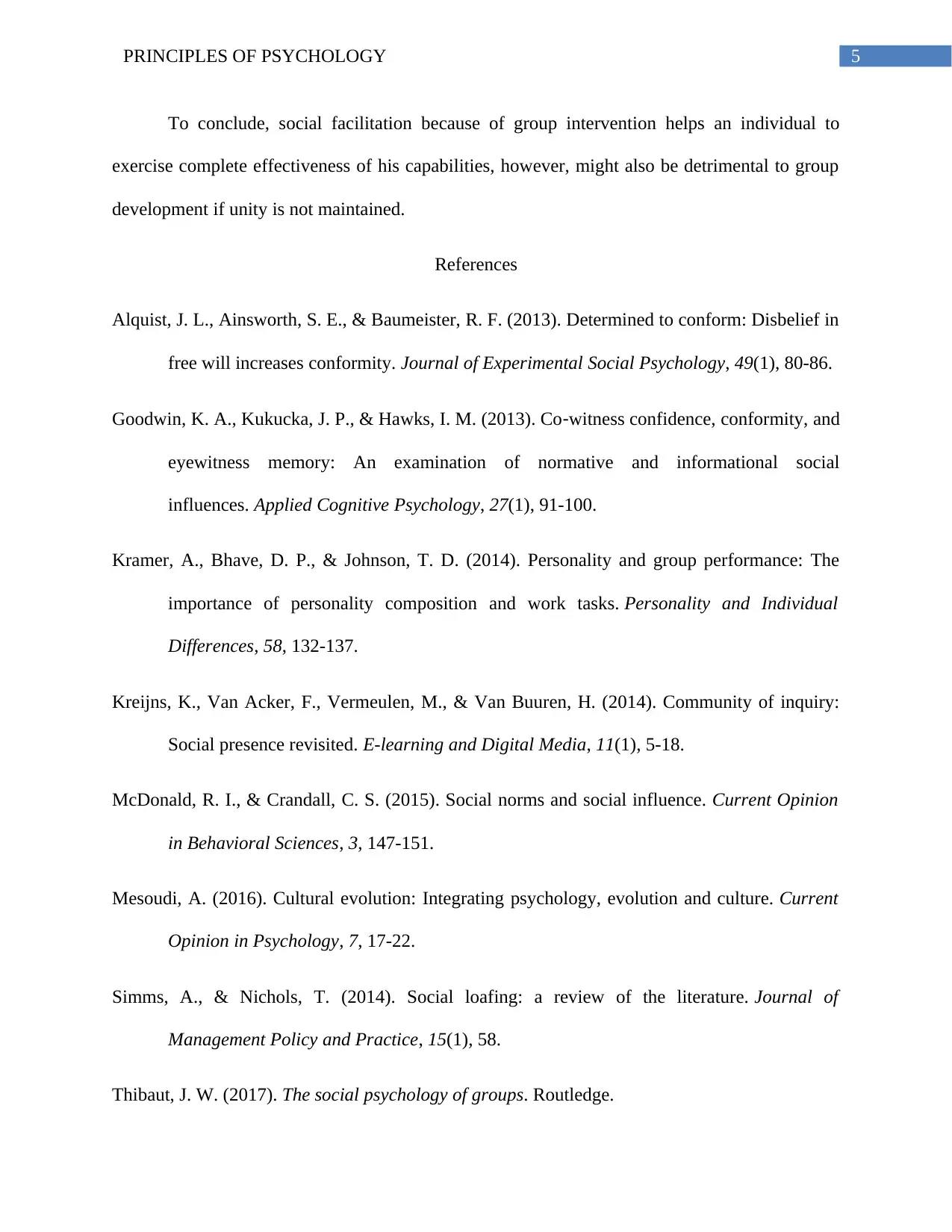
5PRINCIPLES OF PSYCHOLOGY
To conclude, social facilitation because of group intervention helps an individual to
exercise complete effectiveness of his capabilities, however, might also be detrimental to group
development if unity is not maintained.
References
Alquist, J. L., Ainsworth, S. E., & Baumeister, R. F. (2013). Determined to conform: Disbelief in
free will increases conformity. Journal of Experimental Social Psychology, 49(1), 80-86.
Goodwin, K. A., Kukucka, J. P., & Hawks, I. M. (2013). Co‐witness confidence, conformity, and
eyewitness memory: An examination of normative and informational social
influences. Applied Cognitive Psychology, 27(1), 91-100.
Kramer, A., Bhave, D. P., & Johnson, T. D. (2014). Personality and group performance: The
importance of personality composition and work tasks. Personality and Individual
Differences, 58, 132-137.
Kreijns, K., Van Acker, F., Vermeulen, M., & Van Buuren, H. (2014). Community of inquiry:
Social presence revisited. E-learning and Digital Media, 11(1), 5-18.
McDonald, R. I., & Crandall, C. S. (2015). Social norms and social influence. Current Opinion
in Behavioral Sciences, 3, 147-151.
Mesoudi, A. (2016). Cultural evolution: Integrating psychology, evolution and culture. Current
Opinion in Psychology, 7, 17-22.
Simms, A., & Nichols, T. (2014). Social loafing: a review of the literature. Journal of
Management Policy and Practice, 15(1), 58.
Thibaut, J. W. (2017). The social psychology of groups. Routledge.
To conclude, social facilitation because of group intervention helps an individual to
exercise complete effectiveness of his capabilities, however, might also be detrimental to group
development if unity is not maintained.
References
Alquist, J. L., Ainsworth, S. E., & Baumeister, R. F. (2013). Determined to conform: Disbelief in
free will increases conformity. Journal of Experimental Social Psychology, 49(1), 80-86.
Goodwin, K. A., Kukucka, J. P., & Hawks, I. M. (2013). Co‐witness confidence, conformity, and
eyewitness memory: An examination of normative and informational social
influences. Applied Cognitive Psychology, 27(1), 91-100.
Kramer, A., Bhave, D. P., & Johnson, T. D. (2014). Personality and group performance: The
importance of personality composition and work tasks. Personality and Individual
Differences, 58, 132-137.
Kreijns, K., Van Acker, F., Vermeulen, M., & Van Buuren, H. (2014). Community of inquiry:
Social presence revisited. E-learning and Digital Media, 11(1), 5-18.
McDonald, R. I., & Crandall, C. S. (2015). Social norms and social influence. Current Opinion
in Behavioral Sciences, 3, 147-151.
Mesoudi, A. (2016). Cultural evolution: Integrating psychology, evolution and culture. Current
Opinion in Psychology, 7, 17-22.
Simms, A., & Nichols, T. (2014). Social loafing: a review of the literature. Journal of
Management Policy and Practice, 15(1), 58.
Thibaut, J. W. (2017). The social psychology of groups. Routledge.
⊘ This is a preview!⊘
Do you want full access?
Subscribe today to unlock all pages.

Trusted by 1+ million students worldwide
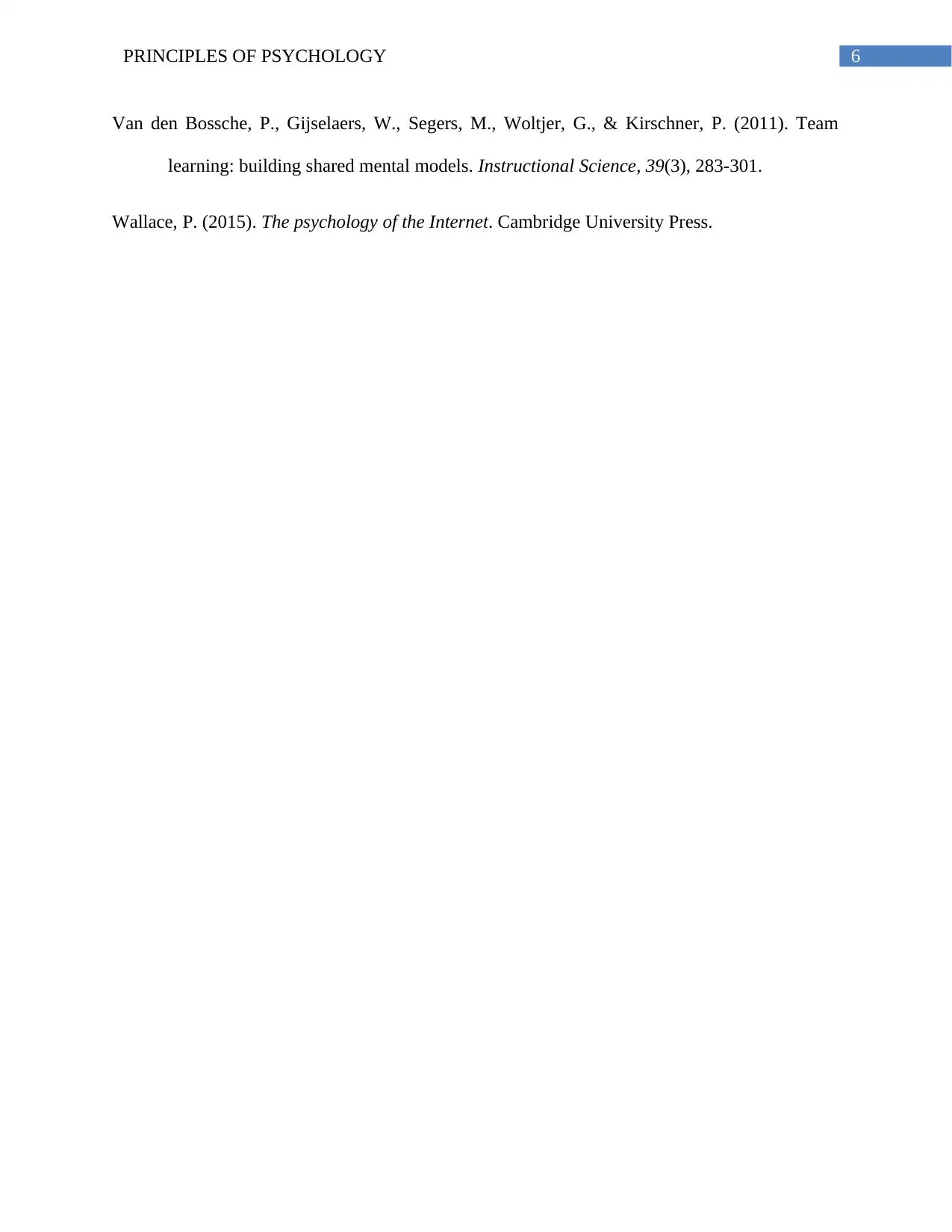
6PRINCIPLES OF PSYCHOLOGY
Van den Bossche, P., Gijselaers, W., Segers, M., Woltjer, G., & Kirschner, P. (2011). Team
learning: building shared mental models. Instructional Science, 39(3), 283-301.
Wallace, P. (2015). The psychology of the Internet. Cambridge University Press.
Van den Bossche, P., Gijselaers, W., Segers, M., Woltjer, G., & Kirschner, P. (2011). Team
learning: building shared mental models. Instructional Science, 39(3), 283-301.
Wallace, P. (2015). The psychology of the Internet. Cambridge University Press.
1 out of 7
Your All-in-One AI-Powered Toolkit for Academic Success.
+13062052269
info@desklib.com
Available 24*7 on WhatsApp / Email
![[object Object]](/_next/static/media/star-bottom.7253800d.svg)
Unlock your academic potential
Copyright © 2020–2026 A2Z Services. All Rights Reserved. Developed and managed by ZUCOL.


